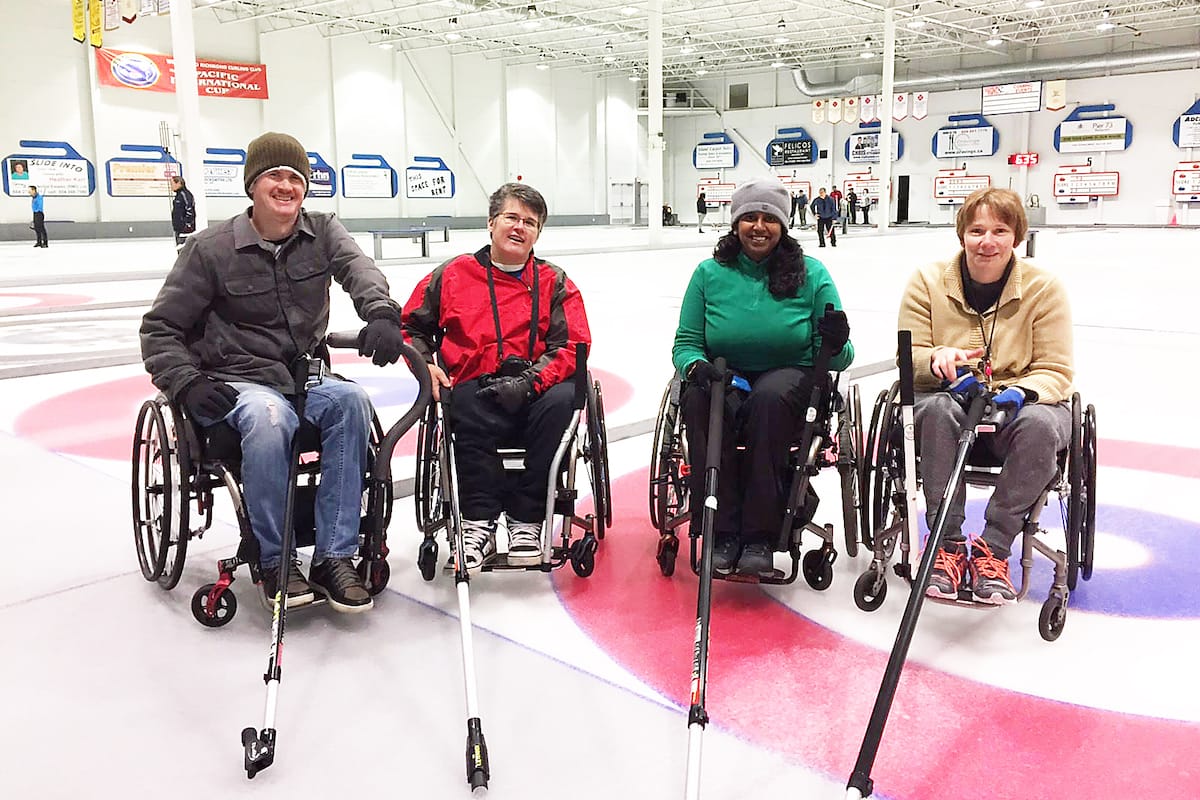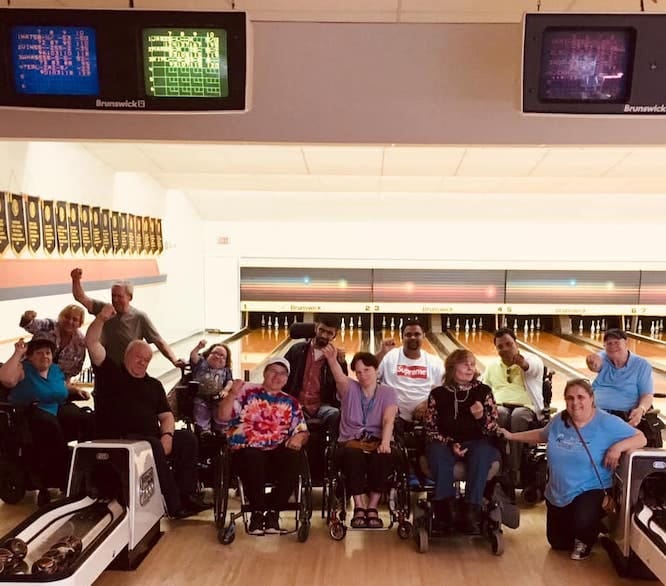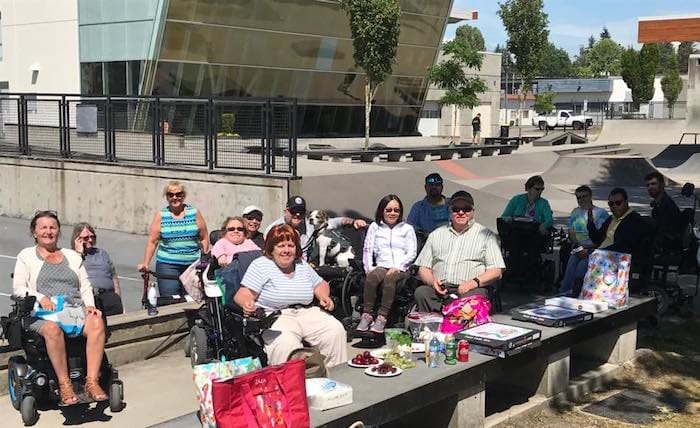In two short years, the South Fraser Active Living Group has taken Peer power to a whole new level.

One of SCI BC’s highest priorities is to nurture the formation of Peer groups throughout our province. When Peers come together, great things happen—knowledge and success stories get shared, lasting friendships are formed, and people discover the power of a collective voice as a tool to create opportunity and positive change.
Over the years, we’ve been gratified to see many success stories througout BC. Peer groups are flourishing in all corners—in our northern communities, the Okanagan, the Lower Mainland, and Vancouver Island.
But by all accounts, we’ve never seen anything quite like the South Fraser Active Living Group, or SFALG.
In just two short years, SFALG has evolved from a Peer coffee group to an advocacy force helping to bring accessible recreation and fitness opportunities to all Peers who live in Surrey, North Delta and the Fraser Valley.
SFALG got its start in April 2017, when three of its founding members—Kim Egger, Renuka Senaratne and Marney Smithies—met at an SCI BC Peer forum. The trio hit it off, and discovered a mutual desire to become more active—particularly after a brutal winter.

“Many of us experienced cabin fever that winter, as many streets remained impassable,” says Egger. “We had all been travelling to Vancouver to do a lot of our physical activity and rehab. Marney and I had been going to PARC at the Blusson Centre, and Renuka had been going to the Mary Pack Arthritis Centre. When we realized we lived close to each other, we set out to find fitness and recreation opportunities in our communities.”
With help and guidance from SCI BC staff members Jocelyn Maffin and Teri Thorson, the trio formed a coffee group. A couple months later, SCI BC Peer Aaron Gelowitz joined the group as the fourth founding member.“We soon recognized there was little to no information available online or in community recreation guides about accessibility in facilities in our communities,” says Senaratne. “Together, we all began visiting and evaluating city recreation centres and for-profit gyms in the Surrey, Delta and Langley areas to see what opportunities were available for people with physical disabilities.”
What they found was disappointing—accessible facilities and adaptive equipment were sparse at best. So they set their sights on a lofty goal: improving the situation.
“We attended the grand reopening of the Newton Recreation Centre in 2017,” says Senaratne. “That day presented the perfect opportunity to introduce ourselves to people involved with recreation in Surrey. We also introduced ourselves to then Surrey Mayor Linda Hepner and councillors, and explained some of us were residents and taxpayers of Surrey who were looking for better recreation opportunities for people with physical disabilities. They all seemed quite shocked we were all travelling to Vancouver.”
SFALG has evolved into a powerful force for change. Membership expanded, regular meetings take place, and the group has achieved excellent results making a difference in the lives of Peers.
“We are similar to many Peer groups—we get together and share similar stories and interests,” says Gelowitz. “But what might make us different from other SCI BC Peer groups is that we’ve also developed into an advocacy group. We continue to lobby leaders from Surrey and Delta for better opportunities for recreation and active living, while asking that barriers to our inclusion be prevented or removed so we can fully participate in the community we live and pay taxes in.”
Being so engaged in their communities means SFALG is continually consulting its growing membership.
SFALG’S IMPRESSIVE ACCOMPLISHMENTS SO FAR
- Created a database of current recreation facilities in Surrey, Delta and Langley and their accessible equipment, and shared with the various municipalities
- Instrumental in getting a chair exercise program started at the Newton Recreation Centre in Surrey
- Successfully lobbied Surrey city councillor Bruce Hayne and other representatives to offer reduced recreation pass rates for people with physical disabilities
- Encouraged their members to try new activities such as trail riding, sledge hockey, camping, bowling, boccia, and curling
- Established new curling opportunities in Delta
- Attended social meetings and indoor/outdoor recreational events in various Fraser Valley communities, to demonstrate ongoing demand for accessible recreation opportunities
- Presented to the Measuring Up Committee in the City of Surrey, which has similar goals
- Successfully advocated (with support from researchers at UBCO) for adaptive exercise tool kits at each of the 10 Surrey Recreation Centres
- Advocated for the repair of arm ergometers and other specialized adaptive fitness equipment in place at Surrey Recreation Centres
- Advocated for more and better disabled parking
- Formed relationships with other groups with common goals, including SCI BC, CP Association of BC, Tetra, Richmond Centre for Disability, and City of Surrey
“Large group meetings are on a monthly basis,” explains Smithies. “We started meeting at a local mall food court—three to five people attended initially. Now we’re meeting at the Surrey Central City Library, and on average 12 people attend. The group continues to be led by its four founding members.”
Smithies adds that most members participate in a variety of Delta and Surrey public events as representatives of SFALG. “Some of our members have attended city council meetings in Delta and Surrey,” she says.
And of course, because SFALG is about active living, many members play sports or work out together—to encourage each other and use the facilities and adaptive recreation and exercise options that SFALG helped create.
“We hope our presence will encourage others and spread the word of the abilities of people with physical disabilities,” says Egger.
Looking to the future, SFALG plans to continue to be a catalyst for increased year round recreation opportunities for people of all ages with physical disabilities living in Surrey, Delta, Langley and in the Fraser Valley.

Gelowitz adds that group members hope SFALG’s approach and success leads to the formation of similar groups, and inspires existing Peer groups around the province to take on more active roles in their communities.
“We hope we’re setting a good example and encourage others to champion similar goals in their communities.
We hope changes in one community leads to a ripple effect in other parts of the Lower Mainland and the province. A group can start with just a few people who meet up and share interests. Through sharing ideas and friendship, you can work towards a goal. We suggest groups tackle one issue/concern to start. They don’t need to do it all.”
The best way to learn more about SFALG and connect with its members is via the group’s Facebook page.
SCI BC has been pleased to support SFALG with financial support, promotion, referrals, moral support and encouragement, and facilitation where necessary. As SFALG has gained momentum, we’ve helped spread the word and made it easier to attract new members.
If you’d like to learn more about how we can help you form a Peer group in your area, or expand your group’s role into an agent of change in your community, please get in touch with Bert Abott (babbott@sci-bc.ca) or Teri Thorson (tthorson@sci-bc.ca).
This article first appeared in our Spring 2019 issue of The Spin, it has been edited for our blog. Read the full version alongside other stories, including:
- Hit The Wall: Wallgym System
- Questionable Timing: Circadian Disruption and SCI
- Grow Your Own: Growing Therapeutic Cannabis
- and more!
Read the full Spring 2019 Issue of The Spin online!



